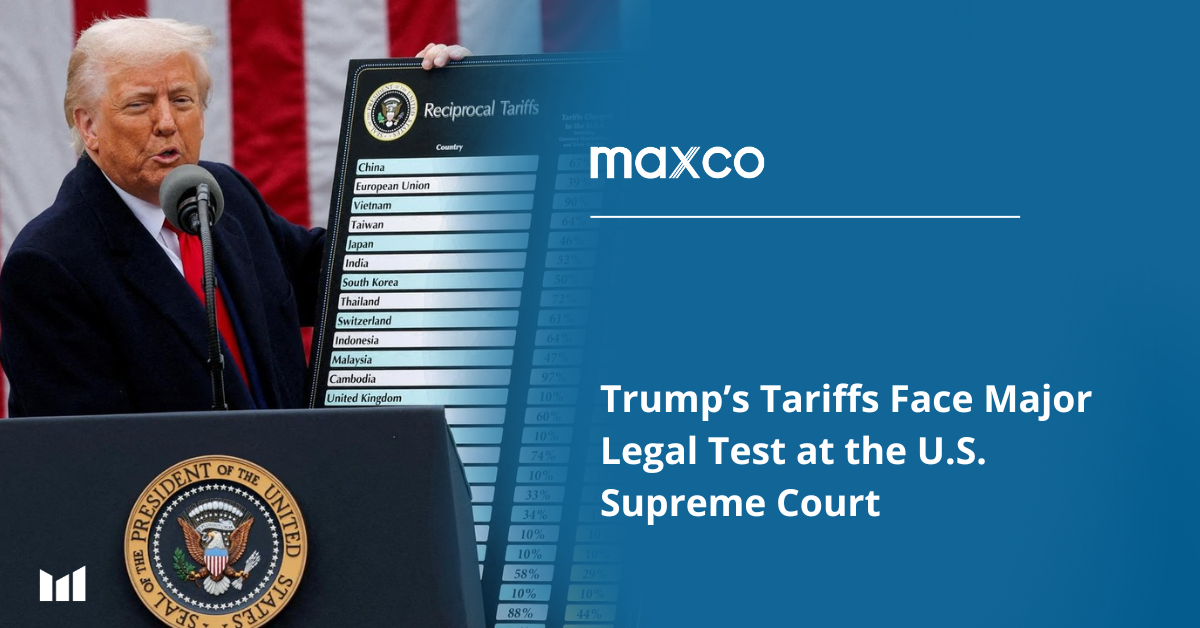Maxco Futures — Former President Donald Trump’s global trade strategy faces its biggest legal challenge this week as the U.S. Supreme Court begins reviewing the legality of the sweeping tariffs imposed by the White House this Wednesday. The ruling could reshape the direction of U.S. trade policy and disrupt the global economic order.
The case was brought by a group of small businesses and several states arguing that the import tariffs, implemented earlier this year, were unlawful because they were enacted without congressional approval. If the Supreme Court decides to overturn the policy, the U.S. government would not only have to rethink its trade strategy but could also be required to refund part of the US$90 billion in import duties already collected.
Trump asserted that losing the case would “weaken the United States” and undermine efforts to protect national security. However, for businesses, the tariffs have triggered a surge in costs and widespread uncertainty.
For example, Learning Resources, an Illinois-based educational toy manufacturer, reported that its tariff burden has increased sevenfold this year to about US$14 million. Meanwhile, Cooperative Coffees, a Georgia-based coffee importing cooperative, has paid around US$1.3 million in tariffs since April.
At the core of the legal dispute is Trump’s use of the 1977 International Emergency Economic Powers Act (IEEPA), which grants the president authority to act swiftly during national emergencies. Trump invoked the law to impose tariffs ranging from 10% to 50% on goods from nearly every country, arguing that the trade deficit posed an extraordinary threat to the U.S. economy.
However, the plaintiffs argue that the statute does not grant the president the power to impose tariffs, as the authority to levy taxes and duties lies solely with Congress.
More than 200 Democratic members of Congress and one Republican senator, Lisa Murkowski, have publicly backed the lawsuit. The Senate has even passed three symbolic resolutions rejecting Trump’s tariff policy — a sign of growing bipartisan concern over the expansion of executive power.
Three lower federal courts have already dismissed the government’s arguments, making the Supreme Court the final arbiter. A ruling is expected between January and June 2026. According to analysts at Wells Fargo, up to US$1 trillion in tariffs could be at stake if the review extends into mid-next year.
Outside the U.S., the legal uncertainty has stalled the ratification of trade agreements with the European Union. Several exporters from Europe and Switzerland — including Swiss chocolate maker Chocolats Camille Bloch — have reported substantial losses due to U.S. tariffs as high as 39% on certain products.
“We hope the ruling will favor common sense,” said CEO Daniel Bloch. “But we’re not confident the court will deliver a quick resolution.”
Regardless of the outcome, the Supreme Court’s decision will redefine the limits of presidential power in economic policy. If Trump prevails, he — and future presidents — would gain far greater latitude to pursue protectionist measures under the guise of national emergencies, a shift that could reshape global trade dynamics for years to come.
Ade Yunus
Global Market Strategies


